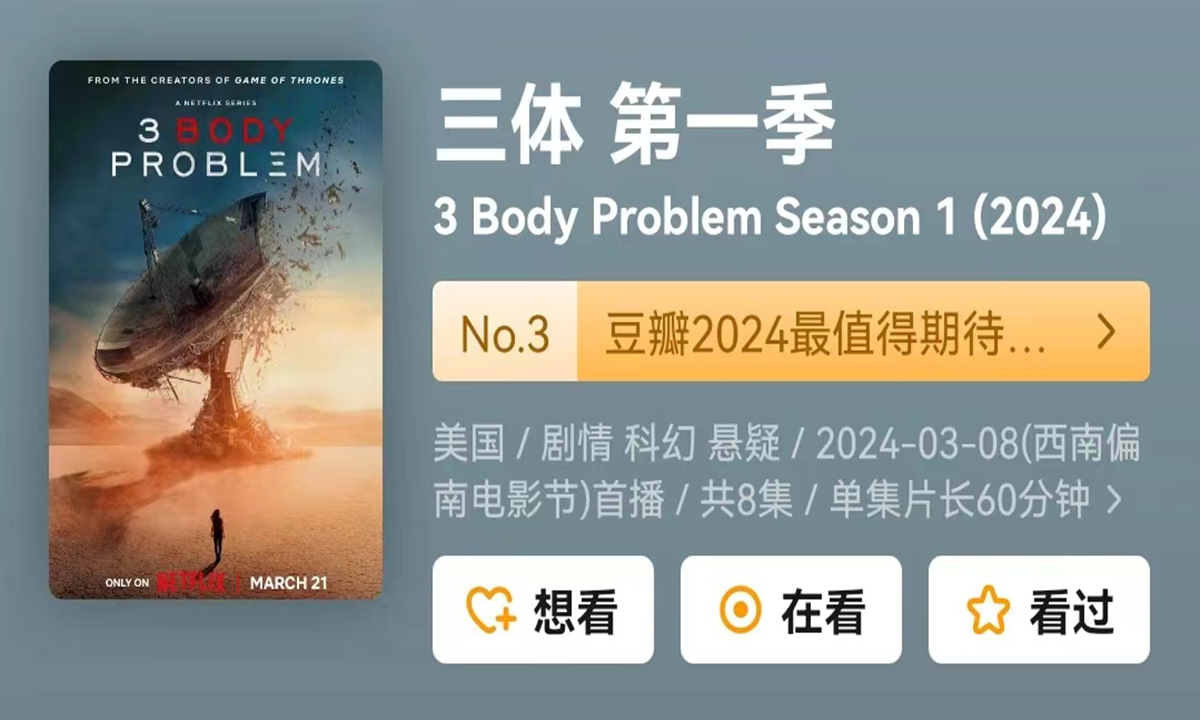
The Netflix adaptation of The Three-Body Problem Photo: Screenshot from Douban
After a Netflix adaptation of
The Three-Body Problem premiered recently, it currently holds an average audience popcorn score of 76 percent on Rotten Tomatoes, with a Douban score of 6.7. The series, as a foreign adaptation of a Chinese science-fiction classic, has sparked a wide range of discussions and mixed reactions among Chinese viewers.
Reactions among Chinese viewers vary. Some approved of Netflix's deliberate globalization of
The Three-Body Problem, crossing continents, cultures, and timelines, believing the fact that
The Three-Body Problem, an IP created in China, can go global is encouraging. Meanwhile, others believe that the show's international cast was chosen to "appease political correctness," and criticized the adaptation as "bland and superficial."
Some Chinese movie critics and experts believe that localizing
The Three-Body Problem to follow the pace of American sci-fi thrillers and mysteries actually reflects a greater cultural difference. While Liu Cixin, the author of the novel, writing such story may in itself embody the simple, romantic cosmology and values of many Chinese people, the creators behind Netflix's adaptation differ, who failed to properly present his values and cosmology, which might be the aspect that leaves audiences most dissatisfied, some critics said.
However, the adaptation is actually due to the tastes or ideas of international audiences being somewhat different from those of Chinese viewers, experts noted. It's not about deliberately denigrating China on an ideological level but about the difficulty in expressing some of the nuances of Chinese culture, they said.
The eight-episode series, based on Chinese novelist Liu Cixin, who is also a Chinese Hugo Award winner, defies human science and takes us on a mind-boggling journey that spans continents and timelines, according to the website of the Netflix.
Some Western media outlets also noticed the reaction of the Chinese viewers, for instance, Reuters said in a recent story that "Netflix's '3 Body Problem' leaves jaws dropped among Chinese viewers," while CNN said that the series "divides opinion and sparks nationalist anger in China."
The co-creators of
The Three-Body Problem are reportedly at work on additional seasons of their Netflix sci-fi television series, though Netflix has yet to announce those plans in any official capacity, fashion magazine Elle reported on Sunday.
Some Chinese viewers have also compared Netflix's series with Tencent's Three-Body, the Chinese adaptation that was released internationally in 2023. As the Netflix version faces growing criticism in China, the Tencent version is being revisited by
The Three-Body Problem enthusiasts, who consider it the best adaptation.
While the Tencent version is viewed as the most faithful to the original by many viewers, it also faced considerable criticism at the time of its release.
The Beijing Youth Daily said in a commentary on Sunday that the Netflix version fundamentally differs in its underlying essence from the original — it's like using Liu's wine bottle to brew a contemporary American story.
Among Chinese netizens, there has been criticism of Netflix for crudely transforming the novel's profound concepts into simple visual spectacles, turning it into a Western heroic-style Hollywood story. There are also complaints about the adaptation of character settings, nationalities, and genders.
However, some hold a different view. A fan of
The Three-Body Problem surnamed Long, who has read dozens Liu's science-fiction novels, told the Global Times on Monday that he believes that Netflix's version is better than the Tencent's series, with a very tight plot.
"Although it lacks many details from the novel, it has greater visual expressiveness in key scenes and the portrayal of sci-fi elements. This series meets the high production standards of American dramas, featuring a dual timeline of Chinese history and Western modernity," Long said.
For many Chinese viewers who are accustomed to watching American TV shows, especially those who haven't read the original book, this series is very accessible, he noted.
"I think the discomfort I feel might precisely lie in the cultural differences. For instance, its localization, featuring people of different skin colors, is what netizens refer to as political correctness," Shi Wenxue, a veteran film critic who is also a preliminary judge of the main competition section at the Beijing International Film Festival, told the Global Times on Monday.
Its narrative follows the rhythm of what is called American-style sci-fi thriller mystery series, Shi said, noting that the creators at Netflix borrowed Liu's characters, his novel's title, and the framework of his worldview, but they failed to accurately present his values and cosmology.
"This, I believe, might be the most dissatisfying aspect for many," the veteran film critic said.
Zhang Yiwu, a professor of Chinese language and literature from Peking University, told the Global Times on Monday that Netflix's series already tell a very different story. "One reason is that Netflix's market is not China and it mainly targets European and American audiences, whose tastes or ideas differ from those of Chinese viewers," he said.
While there are changes influenced by Western ideology, it does not necessarily mean there's a deliberate effort to demean China or any specific arrangement of that nature, Zhang said.
Regarding suggestions and discussions by netizens that Chinese creators should be more cautious in granting adaptation rights, the expert believes that in the process of culture going abroad, indeed, such a dilemma is faced, especially when there is significant audience segmentation.
"Consideration must be given to the tastes of the audience, especially since it is very challenging for Chinese products to be liked abroad and requires significant modifications," Zhang added.




